#marketing for authors
Text
While not for everyone, selling direct does allow authors a certain degree of freedom, and a lot more information that allows authors to get closer to their readers and begin to build that fan base.
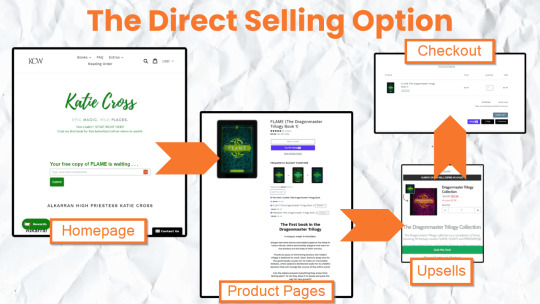
#direct sales#publishing#indie publishing#self publishing#multiple streams of income#Independence from amazon#marketing for authors#marketing
57 notes
·
View notes
Text
How do you market literary fiction, especially as an indie author? Guest spot at @IndieAuthorALLI
I’m surprised to find myself contributing to a marketing guide. Most strategies that work for other authors do zilch for my novels.
That’s because I write literary fiction. It’s hard to promote with keywords and genre groups. It’s also slow to write, so creating newsletters is more difficult than if you’re steadily releasing new titles. And it’s idiosyncratic – each writer is very much their own…

View On WordPress
#Alliance of Independent Authors#literary fiction#marketing#marketing for authors#marketing literary fiction#marketing your self-published book
2 notes
·
View notes
Text
The Brand Challenge; Adding Book Pages To Your Website
I talked about a brand challenge a few months back to encourage you to try something new on your website to help you build content and SEO to support your brand. In this post I’m going to dive deeper with my suggestion to add book pages to your website.
First, were you able to do anything on the list from the first brand challenge? I’d love to hear about it. Let me know in the comments…

View On WordPress
0 notes
Text
Boosting Sales.
I’m doing a series of Boosting Sales on my website blog. It is sort of a journaling effort to put what I’m doing in black and white. In doing this, I’m hoping it will help other authors, but also get feedback on things I am inadvertently missing. I’m covering ways to increase ratings/reviews; facebook advertising; other promos that have and haven’t worked for me.
https://kathylwheeler.com/?s=boosting+sales
Join the conversation. I welcome your thoughts.
0 notes
Text
Support Small Authors
I got hit with a pretty big E.R bill for my daughter (thanks healthcare) and my computer after only a year, is already on the fritz. All of this before the holidays and, surprise surprise, my husband is going to be laid off for a bit right after Christmas. Most of you have already bought my game and stories but reblogs would be wonderful.
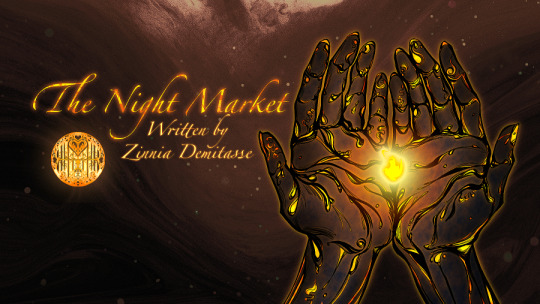
Welcome to the Night Market. Book 1 in a series. The Night Market is an interactive fiction novel in which you awaken to a lantern filled world with no memory of how you got there. Desperate to get home, you must find the gate that leads back to your world, while navigating a foreign land, rife with political intrigue, arbitrary rules and secrets designed to keep you distracted. Nine barons rule the market , a place so vast that not even they can truly know its scope. But, one baron holds the key to your safe return home. Yet, no one has seen or heard from them in over a decade.
Book 1 Steam
Book 1 Itch.io
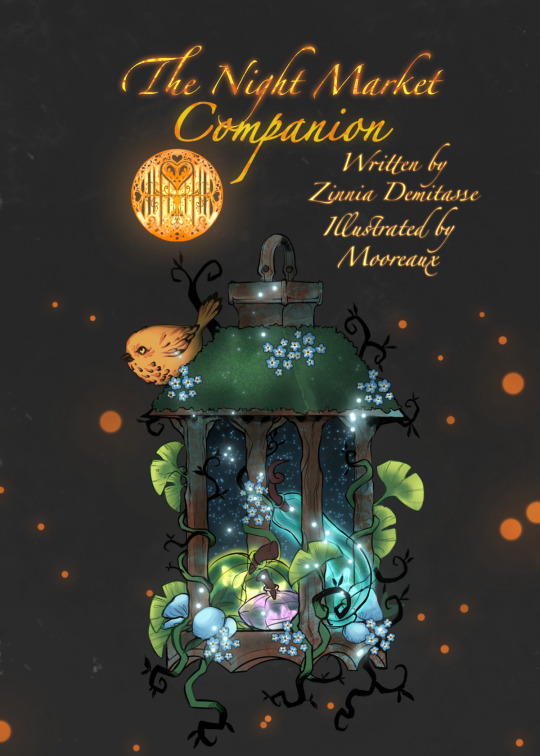
The companion piece to the Night Market with dozens of stories and works of art, all relating to book 1. Find out what each of the RO's was thinking and doing when MC was not around and dive further into the world of the Night Market itself.
Buy on itch.io

Welcome to a Night Market Kristus story. My holiday story for this year. A fully interactive story featuring MC, the RO's, and some new characters that have been introduced in the WIP of book 2. Enjoy this fun romp through a holiday horror show and have a few soft moments with your chosen romance.
Buy on itch.io
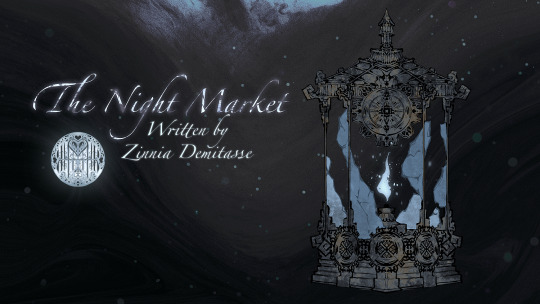
Join my Patreon. Here you will receive monthly lore posts. Short stories each month. Decision making on polls. The occasional development blog. And early access to any of the chapters that are coming out for book 2. Join a high enough tier and I will even write a short story or a lore post for you.
Join here
#the night market#interctive fiction#book 1#twine game#twine fic#angst#original characters#writers of tumblr#lgbtq#poly#small author
435 notes
·
View notes
Text
The new globalism is global labor

For the rest of May, my bestselling solarpunk utopian novel THE LOST CAUSE (2023) is available as a $2.99, DRM-free ebook!

Depending on how you look at it, I either grew up in the periphery of the labor movement, or atop it, or surrounded by it. For a kid, labor issues don't really hold a lot of urgency – in places with mature labor movements, kids don't really have jobs, and the part-time jobs I had as a kid (paper route, cleaning a dance studio) were pretty benign.
Ironically, one of the reasons that labor issues barely registered for me as a kid was that my parents were in great, strong unions: Ontario teachers' unions, which protected teachers from exploitative working conditions and from retaliation when they advocated for their students, striking for better schools as well as better working conditions.
Ontario teachers' unions were strong enough that they could take the lead on workplace organization, to the benefit of teachers at every part of their careers, as well as students and the system as a whole. Back in the early 1980s, Ontario schools faced a demographic crisis. After years of declining enrollment, the number of students entering the system was rapidly increasing.
That meant that each level of the system – primary, junior, secondary – was about to go through a whipsaw, in which low numbers of students would be followed by large numbers. For a unionized education workforce, this presented a crisis: normally, a severe contraction in student numbers would trigger layoffs, on a last-in, first-out basis. That meant that layoffs loomed for junior teachers, who would almost certainly end up retraining for another career. When student numbers picked up again, those teachers wouldn't be in the workforce anymore, and worse, a lot of the senior teachers who got priority during layoffs would be retiring, magnifying the crisis.
The teachers' unions were strong, and they cared about students and teachers, both those at the start of their careers and those who'd given many years of service. They came up with an amazing solution: "self-funded sabbaticals." Teachers with a set number of years of seniority could choose to take four years at 80% salary, and get a fifth year off at 80% salary (actually, they could take their year off any time from the third year on).
This allowed Ontario to increase its workforce by about 20%, for free. Senior teachers got a year off to spend with their families, or on continuing education, or for travel. Junior teachers' jobs were protected. Students coming into the system had adequate classroom staff, in a mix of both senior and junior teachers.
This worked great for everyone, including my family. My parents both took their four-over-five year in 1983/84. They rented out our house for six months, charging enough to cover the mortgage. We flew to London, took a ferry to France, and leased a little sedan. For the next six months, we drove around Europe, visiting fourteen countries while my parents homeschooled us on the long highway stretches and in laundromats. We stayed in youth hostels and took a train to Leningrad to visit my family there. We saw Christmas Midnight Mass at the Vatican and walked around the Parthenon. We saw Guernica at the Prado. We visited a computer lab in Paris and I learned to program Logo in French. We hung out with my parents' teacher pals who were civilian educators at a Canadian Forces Base in Baden-Baden. I bought an amazing hand-carved chess set in Seville with medieval motifs that sung to my D&D playing heart. It was amazing.
No, really, it was amazing. Unions and the social contract they bargained for transformed my family's life chances. My dad came to Canada as a refugee, the son of a teen mother who'd been deeply traumatized by her civil defense service as a child during the Siege of Leningrad. My mother was the eldest child of a man who, at thirteen, had dropped out of school to support his nine brothers and sisters after the death of his father. My parents grew up to not only own a home, but to be able to take their sons on a latter-day version of the Grand Tour that was once the exclusive province of weak-chinned toffs from the uppermost of crusts:
https://en.wikipedia.org/wiki/Grand_Tour
My parents were active in labor causes and in their unions, of course, but that was just part of their activist lives. My mother was a leader in the fight for legal abortion rights in Canada:
https://www.flickr.com/photos/doctorow/8882641733
My dad was active in party politics with the New Democratic Party, and both he and my mother were deeply involved with the fight against nuclear arms proliferation, a major issue in Canada, given our role in supplying radioisotopes to the US, building key components for ICBMs, testing cruise missiles over Labrador, and our participation in NORAD.
Abortion rights and nuclear arms proliferation were my own entry into political activism. When I was 13, I organized a large contingent from my school to march on Queen's Park, the seat of the Provincial Parliament, to demand an end to Ontario's active and critical participation in the hastening of global nuclear conflagration:
https://www.flickr.com/photos/doctorow/53616011737/
When I got a little older, I started helping with clinic defense and counterprotests at the Morgentaler Clinic and other sites in Toronto that provided safe access to women's health, including abortions:
https://www.cbc.ca/news/canada/morgentaler-honoured-by-order-of-canada-federal-government-not-involved-1.716775
My teens were a period of deepening involvement in politics. It was hard work, but rewarding and fundamentally hopeful. There, in the shadow of imminent nuclear armageddon, there was a role for me to play, a way to be more than a passive passenger on a runaway train, to participate in the effort to pull the brake lever before we ran over the cliff.
In hindsight, though, I can see that even as my activism intensified, it also got harder. We struggled more to find places to meet, to find phones and computers to use, to find people who could explain how to get a permit for a demonstration or to get legal assistance for comrades in jail after a civil disobedience action.
What I couldn't see at the time was that all of this was provided by organized labor. The labor movement had the halls, the photocopiers, the lawyers, the experience – the infrastructure. Even for campaigns that were directly about labor rights – campaigns for abortion rights, or against nuclear annihilation – the labor movement was the material, tangible base for our activities.
Look, riding a bicycle around all night wheatpasting posters to telephone poles to turn out people for an upcoming demonstration is hard work, but it's much harder if you have to pay for xeroxing at Kinko's rather than getting it for free at the union hall. Worse, the demonstration turnout suffers more because the union phone-trees and newsletters stop bringing out the numbers they once brought out.
This was why the neoliberal project took such savage aim at labor: they understood that a strong labor movement was foundation of antiimperialist, antiracist, antisexist struggles for justice. By dismantling labor, the ruling class kicked the legs out from under all the other fights that mattered.
Every year, it got harder to fight for any kind of better world. We activist kids grew to our twenties and foundered, spending precious hours searching for a room to hold a meeting, leaving us with fewer hours to spend organizing the thing we were meeting for. But gradually, we rebuilt. We started to stand up our own fragile, brittle, nascent structures that stood in for the mature and solid labor foundation that we'd grown up with.
The first time I got an inkling of what was going on came in 1999, with the Battle of Seattle: the mass protests over the WTO. Yes, labor turned out in force for those mass demonstrations, but they weren't its leaders. The militancy, the leadership, and the organization came out of groups that could loosely be called "post-labor" – not in the sense that they no longer believed in labor causes, but in the sense that they were being organized outside of traditional labor.
Labor was in retreat. Five years earlier, organized labor had responded to NAFTA by organizing against Mexican workers, rather than the bosses who wanted to ship jobs to Mexico. It wasn't unusual to see cars in Ontario with CAW bumper stickers alongside xenophobic stickers taking aim at Mexicans, not bosses. Those were the only workers that organized labor saw as competitors for labor rights: this was also the heyday of "two-tier" contracts, which protected benefits for senior workers while leaving their junior comrades exposed to bosses' most sadistic practices, while still expecting junior workers to pay dues to a union that wouldn't protect them:
https://pluralistic.net/2021/11/25/strikesgiving/#shed-a-tier
Two-tier contracts were the opposite of the solidarity that my parents' teachers' union exhibited in the early 1980s; blaming Mexican workers for automakers' offshoring was the opposite of the solidarity that built transracial and international labor power in the early days of the union movement:
https://unionhall.aflcio.org/bloomington-normal-trades-and-labor-assembly/labor-culture/edge-anarchy-first-class-pullman-strike
As labor withered under a sustained, multi-decades-long assault on workers' rights, other movements started to recapitulate the evolution of early labor, shoring up fragile movements that lacked legal protections, weathering setbacks, and building a "progressive" coalition that encompassed numerous issues. And then that movement started to support a new wave of labor organizing, situating labor issues on a continuum of justice questions, from race to gender to predatory college lending.
Young workers from every sector joined ossified unions with corrupt, sellout leaders and helped engineer their ouster, turning these dying old unions into engines of successful labor militancy:
https://theintercept.com/2023/04/07/deconstructed-union-dhl-teamsters-uaw/
In other words, we're in the midst of a reversal of the historic role of labor and other social justice movements. Whereas once labor anchored a large collection of smaller, less unified social movements; today those social movements are helping bring back a weakened and fragmented labor movement.
One of the key organizing questions for today is whether these two movements can continue to co-evolve and, eventually, merge. For example: there can be no successful climate action without climate justice. The least paid workers in America are also the most racially disfavored. The gender pay-gap exists in all labor markets. For labor, integrating social justice questions isn't just morally sound, it's also tactically necessary.
One thing such a fusion can produce is a truly international labor movement. Today, social justice movements are transnational: the successful Irish campaign for abortion rights was closely linked to key abortion rights struggles in Argentina and Poland, and today, abortion rights organizers from all over the world are involved in mailing medication abortion pills to America.
A global labor movement is necessary, and not just to defeat the divide-and-rule tactics of the NAFTA fight. The WTO's legacy is a firmly global capitalism: workers all over the world are fighting the same corporations. The strong unions of one country are threatened by weak labor in other countries where their key corporations seek to shift manufacturing or service delivery. But those same strong unions are able to use their power to help their comrades abroad protect their labor rights, depriving their common adversary of an easily exploited workforce.
A key recent example is Mercedes, part of the Daimler global octopus. Mercedes' home turf is Germany, which boasts some of the strongest autoworker unions in the world. In the USA, Mercedes – like other German auto giants – preferentially manufactures its cars in the South, America's "onshore-offshore" crime havens, where labor laws are both virtually nonexistent and largely unenforced. This allows Mercedes to exploit and endanger a largely Black workforce in a "right to work" territory where unions are nearly impossible to form and sustain.
Mercedes just defeated a hard-fought union drive in Vance, Alabama. In part, this was due to admitted tactical blunders from the UAW, who have recently racked up unprecedented victories in Tennessee and North Carolina:
https://paydayreport.com/uaw-admits-digital-heavy-organizing-committee-light-approach-failed-them-in-alabama-at-mercedes/
But mostly, this was because Mercedes cheated. They flagrantly violated labor law to sabotage the union vote. That's where it gets interesting. German workers have successfully lobbied the German parliament for the Supply Chain Act, an anticorruption law that punishes German companies that violate labor law abroad. That means that even though the UAW just lost their election, they might inflict some serious pain on Mercedes, who face a fine of 2% of their global annual revenue, and a ban on selling cars to the German government:
https://pluralistic.net/2024/04/10/an-injury-to-one/#is-an-injury-to-all
This is another way reversal of the post-neoliberal era. Whereas once the US exported its most rapacious corporate practices all over the world, today, global labor stands a chance of exporting workers' rights from weak territories to strong ones.
Here's an American analogy: the US's two most populous states are California and Texas. The policies of these states ripple out over the whole country, and even beyond. When Texas requires textbooks that ban evolution, every pupil in the country is at risk of getting a textbook that embraces Young Earth Creationism. When California enacts strict emission standards, every car in the country gets cleaner tailpipes. The WTO was a Texas-style export: a race to the bottom, all around the world. The moment we're living through now, as global social movements fuse with global labor, are a California-style export, a race to the top.
This is a weird upside to global monopoly capitalism. It's how antitrust regulators all over the world are taking on corporations whose power rivals global superpowers like the USA and China: because they're all fighting the same corporations, they can share tactics and even recycle evidence from one-another's antitrust cases:
https://www.eff.org/deeplinks/2024/05/big-tech-eu-drop-dead
Look, the UAW messed up in Alabama. A successful union vote is won before the first ballot is cast. If your ground game isn't strong enough to know the outcome of the vote before the ballot box opens, you need more organizing, not a vote:
https://pluralistic.net/2023/04/23/a-collective-bargain/
But thanks to global labor – and its enemy, global capitalism – the UAW gets another chance. Global capitalism is rich and powerful, but it has key weaknesses. Its drive to "efficiency" makes it terribly vulnerable, and a disruption anywhere in its supply chain can bring the whole global empire to its knees:
https://pluralistic.net/2023/09/21/eight-and-skate/#strike-to-rule
American workers – especially swing-state workers who swung for Trump and are leaning his way again – overwhelmingly support a pro-labor agenda. They are furious over "price gouging and outrageous corporate profits…wealthy corporate CEOs and billionaires [not] paying what they should in taxes and the top 1% gaming the system":
https://www.americanfamilyvoices.org/_files/ugd/d4d64f_6c3dff0c3da74098b07ed3f086705af2.pdf
They support universal healthcare, and value Medicare and Social Security, and trust the Democrats to manage both better than Republicans will. They support "abortion rights, affordable child care, and even forgiving student loans":
https://prospect.org/politics/2024-05-20-bidens-working-class-slump/
The problem is that these blue-collar voters are atomized. They no longer meet in union halls – they belong to gun clubs affiliated with the NRA. There are enough people who are a) undecided and b) union members in these swing states to defeat Trump. This is why labor power matters, and why a fusion of American labor and social justice movements matters – and why an international fusion of a labor-social justice coalition is our best hope for a habitable planet and a decent lives for our families.

If you'd like an essay-formatted version of this post to read or share, here's a link to it on pluralistic.net, my surveillance-free, ad-free, tracker-free blog:
https://pluralistic.net/2024/05/20/a-common-foe/#the-multinational-playbook
#pluralistic#mercedes#germany#trustbusting#apple#eu#south korea#japan#uk#competition and markets authority#dma#dsa#germany supply chain act#alabama#bafa
178 notes
·
View notes
Text
getting tired of people being butthurt that Tolkien didn't include a token female dwarf in the Hobbit company or a girl member in the Fellowship or whatever. Tolkien fought in World War I okay, he fought alongside and in the company of other men and his stories are going to reflect that. The book wasn't written in a vacuum and it can be gender-unbalanced without being problematic or sexist, and I don't see why we have to "acknowledge" that it's sexist "by today's standards" because it's literally not even sexist by TODAY'S standards, it just so happens that not everything is about you all the time. "Today's standards" can and should include being intelligent enough to discern the difference between values dissonance and just having a justifiably different context for writing in
#lotr#lord of the rings#and ultimately I'm also tired of people acting like it's a fault in older authors when their work has unmarketable aspects#because that's ultimately what all this fixing and patching is about#it's about marketing#well guess what#Tolkien never wanted his work to be a franchise#nor did many others
317 notes
·
View notes
Text
Hello! I wrote a book and I think y'all will like it. It's for fans of Good Omens, Hannibal, Angels Before Man, and all the queer people who deserve financial compensation from the catholic church.
I present to you:
FIRST CREATION, a high heat queer horror novella with a trans angel MC and a queer demon LI!

FIRST CREATION is a love letter to fallen angels, to finding your place in the world, to connecting to religion in a way that works for you. To touch and peaches, and surviving horrible things, to finding a place to be holy if God won't give it to you. (it's also nasty, and about cannibalism and shame and guilt, too)
It's a 22k word (98 page) novella that you can read in one (or two, or three) sittings.
You can find it on Amazon and itch.io here to read an actual synopsis and look at reviews. You can also find content warnings at the bottom of my website: (I definitely encourage you to read them before you buy!)
Here's also some unhinged ao3 tags for fun
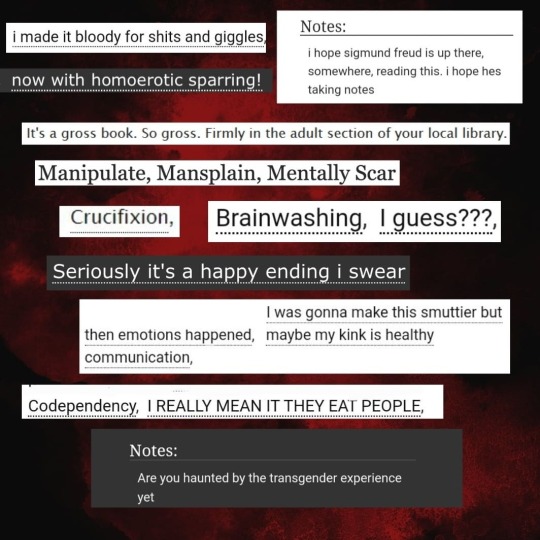
#writeblr#writing#writers on tumblr#good omens#nbc hannibal#novella#queer fiction#queer horror#indie author#indie books#book recommendations#religious trauma#religious themes#angel x demon#fallen angels#god loves you#but not enough to save you#preachers daughter#ao3 tags#how do i market a book#idk im banking on memes and character art right now#first creation#marsadler
597 notes
·
View notes
Text

Made $85 selling books this month. This is a record I think. Who says the industry is rigged in favour of lining distributor pockets.
#I don't make my primary income through sales I make it through Patreon#pour one out for the sales-based authors trying to survive in this market
169 notes
·
View notes
Text
How to Use TikTok to Sell Books: 12 Practical Tips
By Joe Yamulla, October 16, 2023
Estimated reading time: 8 minutes
Boasting over one billion active users, TikTok continues to grow in influence. Almost half the American population uses TikTok — it’s no longer just an outlet to watch silly dances or to learn how to bake your own sourdough bread (though you’ll find plenty of that). As it grows, the platform has become a powerful promotion tool, including for independent authors seeking to build their brands. You can even use TikTok to sell books.
Table of Contents:
• What makes TikTok so effective for authors?
1. Be relatable
2. Post consistently to grow your channel
3. Use the link in your TikTok bio to sell books
4. Be subtle with book promotion
5. Establish yourself as a subject matter expert
6. Package your content for holidays and celebrations
7. Embrace the community
8. Save and utilize your favorite sounds and trends
9. Use titles to draw in more viewers
10. Keep captions brief and prioritize hashtags
11. Get out of your comfort zone
12. Stay up to date with new trends
• How to start using TikTok as an independent author
Book marketing demands research, effort, and an open mind to get creative and experiment with new ideas — especially for indie authors. Because TikTok is wildly popular, you can use it to reach new readers, grow your author brand, and earn more book sales. So, how do you use this impactful platform as an independent author?
35 notes
·
View notes
Text
There is an old copy-paste moving around the internet regarding discussions asserting the inherent Slavicness of The Witcher, and I will record it here for posterity.
(translated from polish)
-write eight books
-have their main character suffer from otherness, prejudice and erroneous stereotypes
-insert anti-racist references at every turn
-make dwarves into Jews
-and use to criticise anti-Semitism
-criticise nationalist attitudes
-criticise xeno- and homophobia at every turn
-show support for a multicultural society and acceptance of otherness
-describe how victims become executioners
-show how violence begets violence
-make it the central theme of the last three volumes
-have the hero and his lover die during a racist pogrom
-defend the persecuted to the lastHear from every corner of the internet that "a black witcher would be a disaster."
-write thirteen stories
-based three on Andersen's fairy tales
-three more on the fairy tales of the Brothers Grimm
-seventh on an Arabian fairy tale
-mock folklore and folk beliefs in the first one
-but also make fun of them in the story "The Edge of the World"
-mock the Polish legend in "The Limits of Possibility"
-name the main character "Żerard" (Jerald)
-generally use mainly names with Celtic roots like Yenefer or Crach
-and those derived from Romance languages such as Cirilla, Falka or Fringilla or Triss
-a few English names such as Merigold
-and those derived from other Germanic languages such as Geralt
-and Italian
-German
-and even French
-borrow monsters from American games, especially from Advanced Dungeons and Dragons
-from Irish, make an elf language
-and from German, make it the language of dwarves
-make the characters celebrate Irish folk holidays
-write an article about where you got your inspiration from
-pour bile on Slavic fantasy in it
-finally write an eighth book
-make one of the key characters a Japanese demoness
Become a champion of turbo-slavism.
/s
#the witcher#the witcher 3#the witcher books#nobody contests The Witcher is the product of the time-place-history and culture experienced by its author#what very much ought to be contested are attempts at painting TW as symbolic of an ideology it very much criticizes#aside ethnonationalism criticism applies to imperialism likewise. not like eastern europe has extensive experience with both or anything#as goes for creative and intellectual inspiration it would be trite to reduce it to the local circle only (and inaccurate)#Sienkiewicz or no Sienkiewicz#at some point the audience must simply read more to know more. helpfully AS has provided a plethora of references + an entire other trilogy#9/10 when you see a discussion about the inherent Slavicness of The Witcher it's thanks to CDPR's excellent marketing strategy#which is a shame
127 notes
·
View notes
Text
Use Your Own Photos As Background Images In Your Graphics

View On WordPress
0 notes
Text
Not to be a hater but the romance book culture is in peril
#I hate u booktok#now say something true and beautiful#the most least sexy high heat novels imagines me coming out lately#wow that sentence is INCOMPREHENSIBLE <3#I feel like a broken record but like#anyway#these books are being chosen becuase the author has a following and she chose the right combination of buzz words to be mass marketable#it’s soulless#squawk tag
73 notes
·
View notes
Text
Forgetting your character is disabled isn't a "good representation" flex: Writing Disability Quick Tips
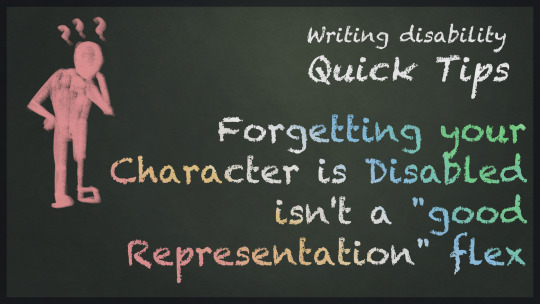
[ID: An image with “Writing Disability quick tips: Forgetting your character is disabled isn't a good representation flex” written in chalk the colour of the disability pride flag, from left to right, red, yellow, white, blue and green. Beside the text is a poorly drawn man in red chalk looking down confused at his leg, one is drawn normally, the other is drawn to resemble a basic prosthetic. He has question marks above his head. /End ID]
For a while, I was involved in the booktok and Tik Tok writing communities, specifically parts of the community focused on more diverse books and authors. During this time, I noticed a reoccurring pattern when people were highlighting stories featuring disabled characters, or even promoting their own books, and that was how often people would say "I kind of forget they have [insert disability here] because they're such a badass."
The intention behind this statement is (usually) good, with people trying to show that their disabled characters are self-sufficient and don't fall into the tired old sad/helpless disabled person trope, however, you can - and very much should - do that without erasing your character's disability. If you find yourself forgetting your character is disabled, or your beta and pre-release readers are commenting about forgetting it, then there's a good chance that's exactly what you've done - and as a disabled person myself, if I see that statement being used in your marketing in particular, it's a giant red flag and a sure fire way to make sure I give the book in question a skip.
Remember, disabilities (especially major ones) are a part of your character's identity, and they're important regardless of the character's personal relationship with it. Even if your character doesn't specifically identify with the label of disabled or doesn't really care that much, it's should still be impacting their daily life, even in small ways. If you're finding yourself forgetting about a major part of your character's identity, it might be a good idea to check and make sure their disability is having an impact on the character.
I see this comment most often with amputee characters, and to me, it's a pretty consistently good indication that the author has treated their character's prosthetic as a cure rather than the mobility aid it is. It's far from unique to amputees, mind you (I talked about this a lot when I was discussing the character of Toph from Avatar), but it's when I tend to see it the most. Remember that mobility aids and other forms of assistive technology and assistive magic (if it's a fantasy story) are just that: they're aids, they assist, they shouldn't be cures.
Of course, this wasn't unique to Booktok, I've seen it on nearly every other social media site with a writing and book-focused community at some point, but Tik Tok was just where I spent the most time and it seems to be where I see the most people specifically gloating about it.
#Writing disability with Cy Cyborg#Quick tips#Disability#Disabled#Disability Representation#Writing Disability#Writing#Writeblr#Authors#Creators#Writing Advice#Disabled Characters#On Writing#book marketing
76 notes
·
View notes
Text
Chapter Three
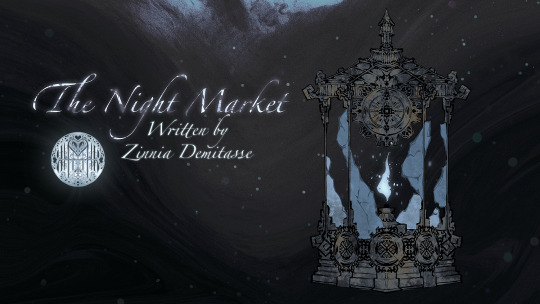
Chapter Three is here! Right now it is early release on Patreon with a public release being on April 8th. Subscribe to the Bog With tier to get access to the chapter. All asks in the next two weeks will be posted under spoilers so do not worry about getting spoiled if you have to wait.
If you do join to support me, I thank you so much! We are back on track now and it feels good!
🪷✨🪷✨ If you want to support me 🪷 ✨🪷✨
🌿 Free Demo 🌿Book 1 Steam🌿Book 1 Itch.io🌿🌿 Patreon 🌿Discord🌿FAQS🌿
#the night market#chapter three#interactive fiction#early access#indie author#self published#lgbtq#angst#writers of tumblr#vampire#angels#witches#poly
330 notes
·
View notes
Text
i havent finished that video so this isn't about that but i think the real and most obvious criticism of the big boom of The Modern Feminist Novelized Retelling of ancient greek myth/lit is how every person considered a prominent contributor to the genre is white and (almost always) british or american
#they are all white all of them. like every single person writing that specific brand of feminist retellings is a white british woman#it isn't a coincidence!#june.txt#and obviously there are recent reception works by authors of colour (home fire and salvage the bones i think most prominently)#but i wonder why only white authors get the specific Feminist Retellings published and marketed that way!
29 notes
·
View notes